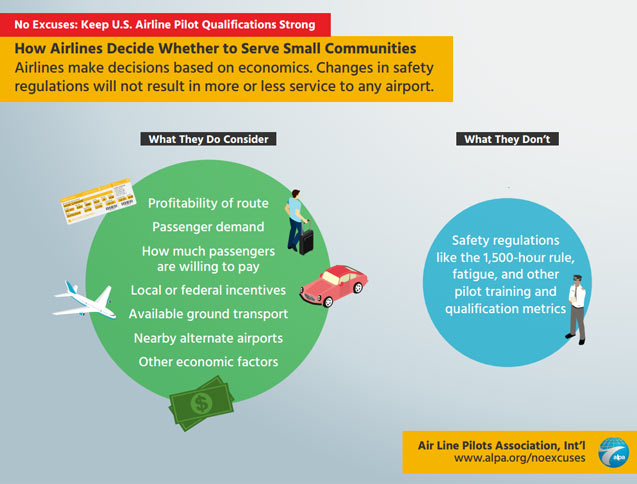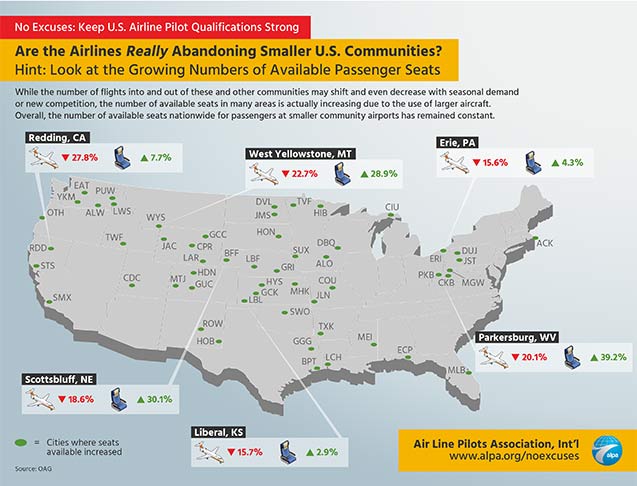Release #: Vol. 85, No. 2
February 24, 2016
No Excuses: Keep U.S. Airline Pilot Qualifications Strong
Airline Business Decisions Determine Small Community Air Service, Not Pilot Availability
Certain airlines are claiming that a pilot shortage is currently causing them to stop serving smaller communities. These claims, however, aren’t supported by facts. The excuse is also rightly being rejected as reason to compromise safety in the pursuit of profit by weakening the pilot qualification standards that have made air travel safer.
“Claims that a pilot shortage is behind any changes in rural community air service are easily dismissed when you look at the facts of what’s actually happening at smaller airports,” said Capt. Paul Ryder (ExpressJet), ALPA’s national resource coordinator. “Airlines make decisions about where they fly based on what’s best for their bottom line—namely how many passengers will buy tickets and how much they’re willing to pay.”
Every day, airlines evaluate the routes they fly based on whether the route is profitable. Many factors influence profitability, but it's primarily based on passenger travel decisions. Such decisions include passengers’ driving to airports with lower ticket prices or passengers’ deciding to drive to their destinations instead of fly.
Another significant consideration is whether federal or local financial incentives exist that would help make a route profitable. In a February 5 story titled “Bridgeport Council to Discuss Chipping in on Airport Incentive Package,” the Exponent Telegram reported on the council’s plans to explore economic incentives to attract airlines to serve North Central West Virginia Airport.
Airport Director Rick Rock was reportedly expected to ask the city council to donate to the minimum revenue guarantee fund for new air service. “Airlines are very risk-averse, so basically what we’re trying to do is put a risk-mitigation program together to get them to take a chance on rural West Virginia,” he said in the Exponent Telegram.
Airlines change the service they offer to reflect changes in passenger demand. For many U.S. communities, the number of flights airlines offer each day may shift with the seasons or because of new competition at the airport.
At many rural airports, a growth in passenger traffic can result in passengers having access to more seats and larger aircraft. While the shifts may occasionally result in fewer scheduled flights, an increase in available seats usually heralds growth opportunities for the local community. “When passengers have more seats available to fly to and from a smaller community airport, local business grows, the local economy gets stronger, more jobs are created, and ultimately more people have the resources and opportunity to travel and ship by air,” said Ryder.
Many smaller communities understand the opportunity and work to influence airlines’ routing decisions. In January 25 coverage of rising passenger numbers at Dubuque Regional Airport, the Telegraph Herald quoted Airport Manager Robert Grierson as saying the “increased passenger traffic should help Dubuque boost its standing in discussions with airlines about expanding air service.” He told the Telegraph Herald, “We can show them a continued pattern of growth, which sends a strong message that we need additional service, additional aircraft, and larger aircraft.”
Pilots available
As ALPA has long maintained, many qualified pilots are currently available to fly for airlines that offer a defined career path along with appropriate pay, benefits, and work-life balance.
In some of the most recent evidence, a story in The Wall Street Journal titled “Republic Airways CEO Says Labor Accord Has Halved Pilot Losses” reported on January 19 that Republic, which had “warned last year it could be forced to file for bankruptcy-court protection amid a pressing pilot hiring and retention challenge, has seen a significant slowdown in pilot losses after sealing a new pay accord.”
Safety rules
The FAA’s first officer qualification and training requirements were prompted by Congress in 2010 following multiple fatal airline accident investigations that identified the pilots’ lack of flight experience and training as factors in the accidents. The safety-focused FAA rules were the result of an industrywide effort led by representatives of regional airlines, which have had years to prepare for the rules taking effect.
“Given the evidence across the industry, it’s clear that today’s safety rules have no bearing on why some companies may not be able to attract qualified pilots,” said Capt. Tim Canoll, ALPA’s president. “False claims of a current pilot shortage are simply no excuse, and ALPA won’t allow aviation safety to be compromised so that a few airlines can boost their profits.”
This article is from the March 2016 issue of Air Line Pilot magazine, the Official Journal of the Air Line Pilots Association, International—a monthly publication for all ALPA members.-###-



